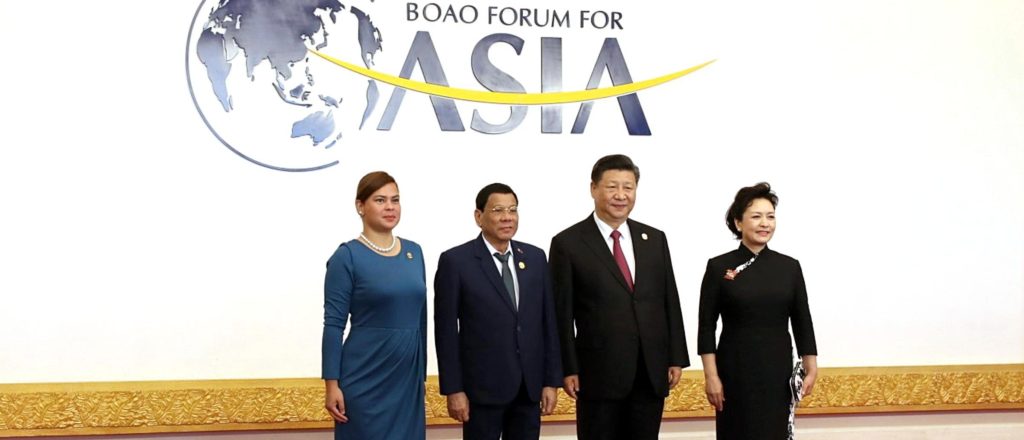
BOAO FORUM President Duterte and his daughter, Davao City Mayor Sara Duterte-Carpio, pose with Chinese President Xi Jinping and his wife, Peng Liyuan, before the opening of the Boao Forum for Asia annual conference inHainan, China. —MALACAÑANG PHOTO
HONG KONG—President Duterte and President Xi Jinping essentially gave the go-signal to work out a framework for joint exploration in the West Philippine Sea between the Philippines and China during their bilateral meeting in Boao, Foreign Secretary Alan Peter Cayetano said on Wednesday.
Cayetano recalled that during the meeting, Xi mentioned that if the Philippines wanted joint exploration, it was willing to discuss and find a solution to the dispute in the South China Sea.
Philippine EEZ
Mr. Duterte then mentioned that it was important for people to see the benefit of the Philippines’ relationship with China, Cayetano said.
But it was clear that both sides stuck to their respective claims, he added.
China claims virtually the entire resource-rich South China Sea, including swaths of the West Philippine Sea, waters within the Philippines’ 370-kilometer exclusive economic zone (EEZ) in the strategic waterway.
The Philippines won a challenge to China’s sweeping claim in the Permanent Court of Arbitration in The Hague in July 2016, strengthening international recognition of its sovereign rights to fish and explore for resources in waters within its EEZ.
But China ignored the tribunal’s ruling, insisting it had historic rights to much of the sea, where islets, atolls and reefs are believed to be sitting atop vast oil and gas deposits, and through which $5 trillion in global commerce passes annually.
Instead of asserting the Philippines’ victory, Mr. Duterte, who came to power shortly before the ruling came down, put it on the back burner and set about mending fences with China and courting Beijing for aid and investment.
He had been talking about “co-ownership” with China of resources in the West Philippine Sea, and traveled to Hainan earlier this week to attend the Boao Forum for Asia and meet with Xi for talks on economic and security cooperation, including a possible deal for joint exploration in the West Philippine Sea.
Cayetano said the statements of the two leaders were very important, as these showed what they wanted next.
‘Go-signal’
“It’s basically the go-signal to come up with a framework, and if it’s acceptable [to] both sides, then we could see the joint exploration done soon,” he said.
Cayetano said he hoped a framework agreement would be completed as soon as possible.
The Philippines is hoping to get an advantageous deal, he added.
“We already told the world, including the Chinese [and] some of the critics in the Philippines, that we desire a contract that is as good or better than Malampaya. Why as good or better than Malampaya? Because Malampaya is an area that is undisputed, purely under Philippine laws, yet we’re getting 60-40,” he said.
The Malampaya service contract, which involves extracting natural gas from the waters off Palawan Island, has a production-sharing scheme under which the government gets 60 percent of earnings from the project after certain charges are deducted.
Whether China will agree to a similar arrangement in the West Philippine Sea remains to be seen, as it will likely pay most of the cost of exploration.
Military buildup
China is also unlikely to agree to play second fiddle to any of its rivals for territory in the South China Sea.
On Wednesday, China launched three days of naval drills near Hainan, its southernmost province, underscoring its growing capabilities in defending its maritime interests.
Those exercises follow recent ones in the disputed waterway featuring China’s sole operating aircraft carrier that come amid deployments and drills by the rival US Navy.
China’s Maritime Safety Administration said the exercises began on Wednesday and would last through the end of Friday.
China is building new vessels at a rapid pace to equip its navy, coast guard and maritime law enforcement agencies, including its first entirely domestically built aircraft carrier.
Hainan is home to a major military presence, including naval air stations and the country’s largest submarine base. —WITH A REPORT FROM AP